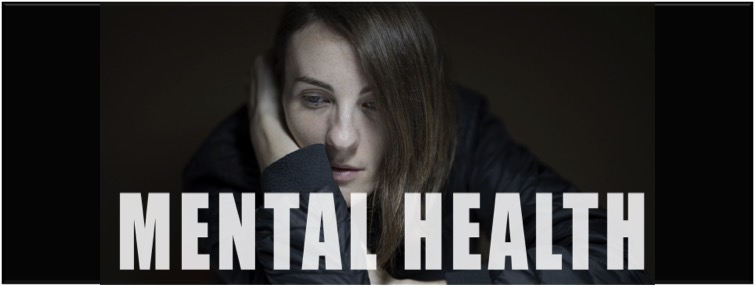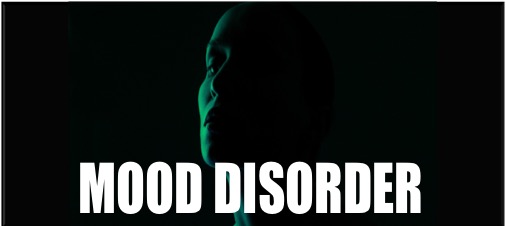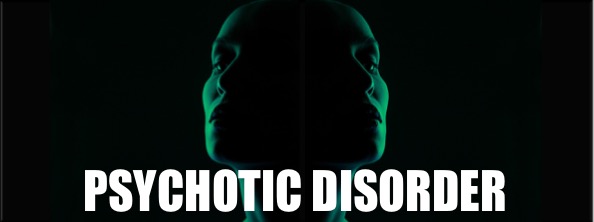Signs for Anxiety Disorder - Overview
Anxiety is a normal reaction to stress and it is beneficial in some situations. It can alert us to dangers, and help us prepare and pay attention to them. Occasional anxiety can be considered as a normal part of every one’s life. But for sure everyone should be aware of signs of anxiety disorder.
Normally, people worry about things associated with health, wealth and family problems. but anxiety disorders is different. Anxiety disorders are different from normal feelings of nervousness or anxiousness because they involve excessive fear or anxiety.
People with anxiety disorders frequently have intense, excessive and constant worry and fear about everyday situations. Anxiety disorder is considered as the most common mental disorder.
ANXIETY DISORDER FACTS IN UNITED STATES
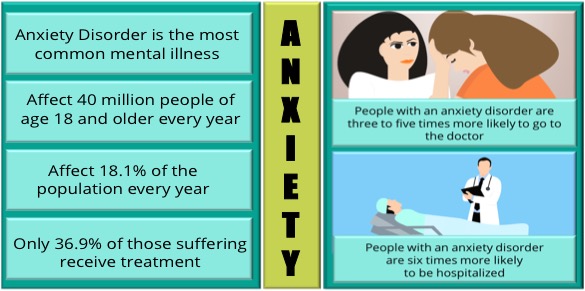
For people dealing with an anxiety disorder, the anxiety does not go away and may get worse over the time. The symptoms can affect on daily activities like job performance, schoolwork, and relationships.
What Are Anxiety Disorders?
Anxiety disorder is a neurological disorder. It is mainly characterized by anxiety, nervousness, worry and other emotional experiences. It is one of the most common type of mild mental illnesses.
Anxiety is a normal emotional state. Anxiety is result of your brain’s reaction to stress and alerting you of potential danger ahead. Everyone feels anxious now and then, and occasional anxiety is perfectly fine.
But anxiety disorders are different. These disorders are type of mental health conditions that causes constant and overwhelming anxiety and fear.
If you have signs of anxiety disorder then you respond to certain situations with fear and dread. You experience physical signs of anxiety, which are pounding heart and sweating. You may feel anxious and nervous if you need to tackle any problem at work, face an interview, take a test or make an important decision.
An anxiety becomes disorder when:
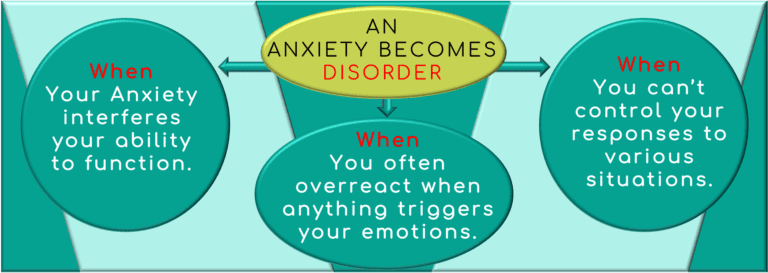
- Your Anxiety interferes your ability to function.
- You often overreact when anything triggers your emotions.
- You can’t control your responses to various situations.
Anxiety disorders make it difficult to follow daily routine. The excessive anxiety can force you to avoid work, school, family get-togethers, and other social situations, and that might worsen your symptoms.
Who is at risk for anxiety disorders?
A combination of genetic and environmental factors may raise a person’s risk of developing anxiety disorders. You may be at higher risk when you have or had:
- Certain personality characteristics, such as shyness or behavioural inhibition (feeling uncomfortable and avoiding unfamiliar people situations or environments.)
- Stressful or traumatic events any time in early childhood or adulthood.
- Family history of anxiety disorder or any other mental health condition.
- Certain physical conditions like thyroid problems and heart arrhythmias (unusual heart rhythms).
Its been Observed that anxiety disorders occur more often in women. Researchers are still studying why this happens. May be it comes from women’s hormones. Specially those hormones which fluctuate throughout the month. The testosterone hormone may play a role too. Men have more testosterone and it may ease anxiety. Also, women are
less likely to seek treatment for this problem, so their anxiety worsens.
What are the signs for anxiety disorder
The main symptom of anxiety disorder is excessive worry or fear. Anxiety disorders also can make it hard to breathe, sleep, stay still, and concentrate. Your specific symptoms depends upon the type of anxiety disorder you have.
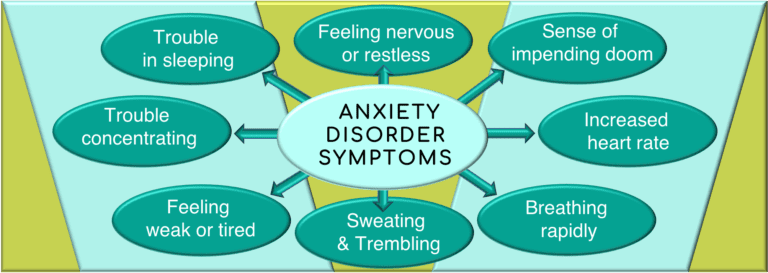
Symptoms may vary depending on type of anxiety disorder you have. General symptoms of an anxiety disorder include these symptoms:
Physical symptoms:
Cold or sweaty hands – This happen because of Hyperhidrosis. Hyperhidrosis limits your blood flow to the hands, making them cold and clammy.
Dry mouth – This refers to a condition in which the salivary glands of mouth do not make enough saliva to keep your mouth wet.
Heart palpitations – Heart palpitations are feelings of having a fast-beating, fluttering and pounding heart.
Nausea – Nausea is an uneasy feeling of stomach that often accompanies the urge to vomit, but does not always lead to vomiting.
Numbness or tingling in hands or feet.
Muscle tension- Muscle tension refers to those condition in which muscles of body remain semi-contracted for an extended period.
Shortness of breath – It is described as an intense tightening in the chest, feeling air hunger, difficulty in breathing, breathlessness or a feeling of suffocation.
Mental symptoms:
- Feeling panic, fear and uneasiness.
- Nightmares.
- Flashbacks or Repeated thoughts of traumatic experiences.
- Uncontrollable, obsessive thoughts.
Behavioral symptoms:
- Inability to be still and calm.
- Ritualistic behaviors, such as washing hands repeatedly.
- Trouble in sleeping.
Mental symptoms:
- Feeling panic, fear and uneasiness.
- Nightmares.
- Flashbacks or Repeated thoughts of traumatic experiences.
- Uncontrollable, obsessive thoughts.
Causes of anxiety disorders
The real causes of anxiety disorders are still not completely understood. Life experiences like traumatic events appear to trigger anxiety disorders in certain people who are already prone to anxiety. Inherited features also can be a factor.
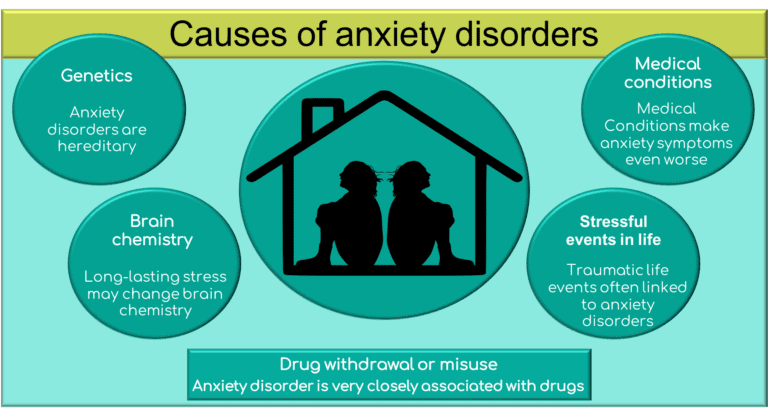
Genetics
Anxiety disorders are hereditary, they tend to run in families and you may inherit these disorders from one or both the parents.
Brain chemistry
Severe or long-lasting stress may change the chemical balance in your brain that controls your mood. Experiencing a lot of stress over a very long period of time can lead to an anxiety disorder.
Environmental stress
Experiencing a trauma can trigger an anxiety disorder, especially in those who have inherited a higher risk to start. Environmental stress refers to stressful events you have seen in life. Childhood abuse and neglect, a death of a loved one, or being attacked or seeing violence are some of the life events often linked to anxiety disorders
Drug withdrawal or misuse
Specific drugs are used to hide or decrease certain anxiety symptoms. Anxiety disorder is very closely associated with alcohol and substance use.
Medical conditions
Some heart, lung, and thyroid conditions may cause symptoms of anxiety disorders or make anxiety symptoms even worse. It’s very important to get a full physical checkup to rule out other medical conditions when talking to your doctor about anxiety disorder.
Types of Anxiety Disorders - Several types of anxiety disorders exist
Agoraphobia
Agoraphobia is an anxiety disorder that causes intense fear of getting drown (in some situation or something) or unable to escape or get help. Because of fear and anxiety, people with agoraphobia often avoid new places and unfamiliar situations like open or enclosed spaces, Crowds, Places outside your home and public transportation.
Anxiety disorder due to a medical condition
This includes signs of anxiety disorder like intense anxiety or panic which are directly caused by a physical health condition.
Generalized anxiety disorder
This includes continuous and excessive anxiety and worry about routine activities or events. This worry is out of proportion to the actual circumstance, it is difficult to control and affects how you feel physically. It usually occurs along with another anxiety disorders or depression.
Treatment for generalized anxiety disorder
Few different types of medications are used as treatment for generalized anxiety disorder, including Antidepressants, Buspirone and Benzodiazepines. You should take medication as prescribed by doctor because some of these may be habit forming.
Panic disorder
This involves repeated episodes of intense anxiety and fear that reach to the peak within few minutes. You may have feelings that something tragic is about to occur, you may feel shortness of breath, chest pain, or heart palpitations. These panic attacks can lead to worry about them happening again or avoiding situations in which they have occurred.
Selective mutism
In Children, this is a consistent failure to speak in certain situations, like school, even when they speak properly in other situations like home, with close family members. This disorder can interfere with school, work and social functioning.
Separation anxiety disorder
Separation anxiety disorder is a type of mental health problem. Generally a child with separation anxiety disorder worries a lot about being apart from family or other close people. These childes have a fear of, being lost from their family members or, of something bad occurring to a family member if he or she is not with that person.
Social anxiety disorder (social phobia)
This involves high level of anxiety, intense fear and total avoidance of social gatherings because of feelings of embarrassment, self-consciousness and worry of being judged or viewed negatively by others.
Specific phobias
Specific phobias are unreasonable fear of objects or situations that pose little real danger but provoke anxiety and avoidance. Specific phobias are long lasting and cause intense physical and psychological reactions. They can affect your ability to function normally at work place, at school or in any social settings.
Substance-induced anxiety disorder
When signs of anxiety disorder like intense anxiety or panic are a direct result of misusing any kind of drugs, taking specific medications, getting exposed to a toxic substance or withdrawal from those drugs.
Other specified anxiety disorder and some unspecified anxiety disorder
are the terms for anxiety or phobias that do not meet the criteria for another anxiety disorders but they are significant enough to be distressing and disruptive.
Risk factors for Anxiety Disorders
Risk factors for anxiety disorders include:
History of mental health disorder
If you are having another mental health disorder, like depression, raises your risk for anxiety disorder.
Childhood sexual abuse
Having experience of emotional, physical, and sexual abuse or neglect during childhood is somehow linked to anxiety disorders later in the life.
Trauma
Living through a traumatic event increases the risk of post-traumatic-stress disorder (PTSD), this can cause panic attacks.
Negative life events
Negative or stressful life events like losing parents in childhood increase your risk for anxiety disorder.
Severe illness or chronic health condition
In this situation constant worry about your own health or the health of loved ones, or caring for a sick family member may cause you to feel overwhelmed and anxious.
Substance abuse
The use of illegal drugs and alcohol makes you more likely to develop an anxiety disorder. People sometimes use these substances to hide or ease their anxiety symptoms.
Being shy as a child
Shyness during childhood and withdrawal from unfamiliar situations, people and places is directly linked to social anxiety in teens and adults.
Low self-esteem
Negative perceptions about self can lead to social anxiety disorder.
Complications Associated with Signs of Anxiety Disorder
The natural response to stress and anxiety helps the body cope with temporary difficult situations. Adrenaline hormone is involved in the fight or flight response. A sudden release of hormone adrenaline prepares body to flee from danger or to confront it physically.
Once, the fear trigger goes away, adrenaline levels quickly revert to the normal. If anxiety continues and adrenaline levels remain high, further problems may arise.
Having signs of anxiety disorder can also lead to, or worsen, some other mental and physical conditions, such as:
- Depression and Substance misuse
- Trouble sleeping (insomnia)
- Digestive or bowel problems,
- Headaches and chronic pain
- Social isolation and problems functioning at school or work
- Poor quality of life and Suicide
Anxiety Disorder Diagnosis
If you have symptoms of anxiety disorder, your doctor will examine you and ask few questions about your medical history. They may run few tests to rule out those health conditions which might be causing your symptoms. In fact, no lab tests can specifically diagnose anxiety disorders.
If your doctor does not find any physical reason for your condition, they will send you to a psychiatrist or psychologist or any other mental health specialist. These doctors will ask questions and use tools and testing to find out whether you have an anxiety disorder or not.
Your doctor will consider how long you have had symptoms and how intense they are. It is important tell your doctor or counsellor if your anxiety makes it hard to enjoy or complete your everyday tasks at home, at work, or at school.
The United States Preventive Service Task Force has recommended
- Screening for anxiety disorder in children & adolescents aged 8 to 18 years and
- Screening for major depressive disorder (MDD) in adolescents aged 12 to 18 years.
Prevention of Signs of Anxiety Disorder
There’s no way to predict the cause for developing signs of an anxiety disorder, but you can surely take steps to reduce the impact of symptoms
· Get help as early as possible. Anxiety, like many other mental health conditions, can become more difficult to treat if you wait.
Stay as active as possible. Participate in activities that make you feel good you enjoy and be happy about yourself. Enjoy healthier social interaction and relationships, which may lessen your worries.
Avoid alcohol or drug use. Alcohol and drug use may cause or worsen anxiety. If you’re addicted to any of these substances, quitting also can make you anxious. If you can not quit on your own, see your doctor or find a support group which can help you.
Treatments for Anxiety Disorder generalised and other types
Medications can not cure an signs of anxiety disorder. But by improving symptoms of anxiety disorder, they can help you function better. Medications for anxiety disorders often include:
Anti-anxiety medications
These may decrease your anxiety, panic and worry. They work quickly also, but you can build up a tolerance to them and that makes them less effective with the time. Your doctor might suggest an anti-anxiety medication for short-term.
Antidepressants
These can also help improving anxiety disorders. They change the way your brain uses certain chemicals to improve your mood and reduce stress. Antidepressants can take some time to start working, so be patient.
Beta-blockers
These usually used for high blood pressure, they can help reduce some physical symptoms of anxiety disorders. They can also relieve rapid heartbeat as well as shaking and trembling.
It is important to find out right medication combination and dosage. You need to cooperate with your doctor and don’t change the dose without consulting. Your doctor will monitor you to make sure that the medicines are working properly without causing any negative side effects.
How does psychotherapy treat signs of anxiety disorder?
Psychotherapy, also known as talk therapy or psychological counselling, It helps you to deal with your emotional response to the problem. Psychotherapy involves working with the therapist to reduce your anxiety symptoms. It is considered as an effective treatment for anxiety disorder.
A mental health provider (Counsellor) talks through strategies to help you better understand and manage the disorder. Approaches include:
Cognitive behavioural therapy (CBT) It is the most common type of psychotherapy used for anxiety disorders. CBT for anxiety teaches you to recognize the thought patterns and behaviours that lead to troublesome feelings. It is Generally a short-term treatment. Cognitive behavioural therapy (CBT) focuses on teaching you the specific skills to improve your symptoms and then gradually return to the activities you have avoided because of anxiety.
Exposure therapy
focuses on dealing with the fears behind the anxiety disorder. In this therapy you gradually encounter those objects or situations that triggers your anxiety so you can build confidence that you can manage any situations and anxiety symptoms. It helps you dealing with those situations and activities you may have been avoiding before. Your health care provider may also use relaxation exercises and imagery with exposure therapy.
When to see a doctor
- When you feel like you are worrying too much and it is interfering in your work, relationships and other parts of life.
- When your fear, worry or anxiety is upsetting you and it is difficult to control.
- When you feel depressed, you have trouble with alcohol or drug use, or you have other mental health problems along with anxiety.
- When you think your anxiety can be linked to other physical health problem.
- When you have suicidal thoughts or behaviours, if this is the case, go for emergency treatment immediately
Your worries might not go away on their own, and they might get worse with the time if you do not seek help. Consult your doctor or a mental health provider before your anxiety disorder gets worse. It’s really easier to treat if you get help early.
Halenesspro Opinion: Managing Anxiety Disorder Symptoms
These tips can help you to control or lessen your anxiety disorder symptoms:
Learn more about your disorder. The more you know, the better prepared you will be to manage your disorder. Don’t be afraid to ask your doctor any questions if you have. Consider yourself as key part of your health care team.
Stick to your treatment plan as suggested. Suddenly stopping your medicines may cause side effects and can even trigger anxiety symptoms.
Cut down on foods and drinks that have caffeine, like tea, coffee, cola, energy drinks and chocolate. Caffeine is a mood-altering drug, it may worsen symptoms of anxiety disorders .
Don’t use alcohol and other recreational street drugs. Substance abuse increases your risk of anxiety disorders.
Eat right and exercise well. Brisk aerobic exercises and biking help in releasing brain chemicals that improve your mood.
Get better sleep. Sleep issues and anxiety disorder mostly seen together. Getting good rest should be a priority. You must follow a relaxing bedtime routine.
Learn to relax. Stress management is a very important part of anxiety disorder treatment plan. Practices like meditation or mindfulness helps you unwind a stressful day and make your treatment work better.
Keep a journal. Writing down your thoughts before the day ends may help you relax. It keeps you away from anxious thoughts all night.
Manage your negative thoughts. Thinking positive thoughts in place of worrisome ones may help you reduce anxiety. This can be challenging when you have certain types of anxiety disorder. Cognitive behavioural therapy teaches you how to redirect your thoughts.
Get together with friends. Whether it’s in person or not, social connections help people to stay healthy. People who have a close group of friends who support them and chat with them have really lower levels of social anxiety.
Seek support. Sometimes people find it helpful to talk to others who are experiencing same problems and emotions. Self-help and support groups let you share your experience and achievements with those who are or who have been there.

